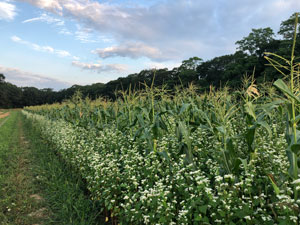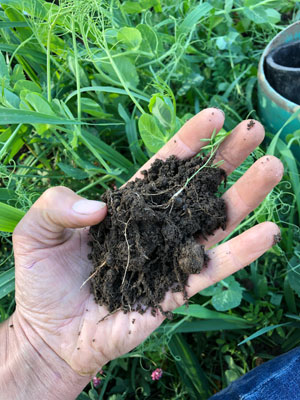Organizing for Soil Health
NOFA Interstate Council
Organizing for Soil Health: A Project of the Northeast Organic Farming Association
 This White Paper is a report on the regional “Organizing for Soil Health” project supported by Farm Aid and Clif Bar and carried out by the seven state Chapters of the Northeast Organic Farming Association (NOFA) in 2019 – 2020. Based on two years of project engagement with regional organic and conventional farmers thru conference workshops, educational events, field days, roundtable discussions and a final survey, this paper presents a timely grassroots-up perspective for policy makers on what farmers need to support climate mitigation practices.
This White Paper is a report on the regional “Organizing for Soil Health” project supported by Farm Aid and Clif Bar and carried out by the seven state Chapters of the Northeast Organic Farming Association (NOFA) in 2019 – 2020. Based on two years of project engagement with regional organic and conventional farmers thru conference workshops, educational events, field days, roundtable discussions and a final survey, this paper presents a timely grassroots-up perspective for policy makers on what farmers need to support climate mitigation practices.
Faced with the existential threat of the Climate Emergency, as government entities try to craft policies that will make real reductions in the generation of greenhouse gases, it is time to listen to the voices of family farmers. Practitioners who are dedicated to soil health can guide policymakers to the most effective mechanisms to incentivize and sustain the shifts in agricultural practices that can mitigate climate change through soil carbon sequestration and other ecosystem services.
At long last, science has been catching up with farmers, validating as climate friendly numerous longtime organic, sustainable and indigenous agriculture practices that maintain and increase soil carbon levels including cover cropping, crop rotations, composting, rotational grazing, promoting biodiversity, minimizing soil disturbance, proven techniques that foster soil health. Farmers value these practices that build farmland resilience to the increasing climate change effects of drought, flooding, wind, heat, freezing and other weather extremes. It is to the national and worldwide good to provide public support and compensation to farmers to help bear the costs of these additional farming practices.
 Regrettably, some of the current federal legislative and policy initiatives are focusing instead on privately run carbon market approaches where businesses can offset their continuing negative environmental impacts by purchasing carbon credits. Most of these carbon market schemes, structured to attract larger scale farmers who agree to modify their agricultural practices, offer payments based on measuring the annual increases of soil carbon sequestered from the atmosphere. Because accurate soil carbon measurement is still an unrealized scientific goal, this approach is problematic with potential for businesses to greenwash their touted net zero reduction effects. Meanwhile, their polluting externalities continue unabated, often severely impacting the communities of color living near their industrial sites. Further, the proffered current carbon market schemes only reward new adaptors, leaving tried and true soil health practitioners to finance their own beneficial practices.
Regrettably, some of the current federal legislative and policy initiatives are focusing instead on privately run carbon market approaches where businesses can offset their continuing negative environmental impacts by purchasing carbon credits. Most of these carbon market schemes, structured to attract larger scale farmers who agree to modify their agricultural practices, offer payments based on measuring the annual increases of soil carbon sequestered from the atmosphere. Because accurate soil carbon measurement is still an unrealized scientific goal, this approach is problematic with potential for businesses to greenwash their touted net zero reduction effects. Meanwhile, their polluting externalities continue unabated, often severely impacting the communities of color living near their industrial sites. Further, the proffered current carbon market schemes only reward new adaptors, leaving tried and true soil health practitioners to finance their own beneficial practices.
Instead of carbon markets and carbon banks, NOFA urges Congress to improve and increase funding to existing USDA conservation programs including the Environmental Quality Incentives Program (EQIP), the Conservation Stewardship Program (CSP), the Conservation Reserve Program (CRP) and the Agricultural Conservation Easement Program (ACEP) that support and reward all farmers who are performing and/or transitioning to bona fide soil carbon sequestration practices that provide further eco-system services such as enhancing water quality and reducing erosion. NOFA supports the Agricultural Resilience Act in the House and the Climate Stewardship Act in the Senate, 2021 grassroots-up legislation that will speed adoption of soil health and other practices that contribute to mitigating climate change.
Special thanks go out to Caro Roszell, White Paper author and project education director; Elizabeth Henderson, editor; David Pontius, NOFA webmaster, Matthew Jatkola, graphic designer and Julie Rawson without whom this project would not have come about.
Online version of report below
Thank you to the reports sponsors
Support Our Work